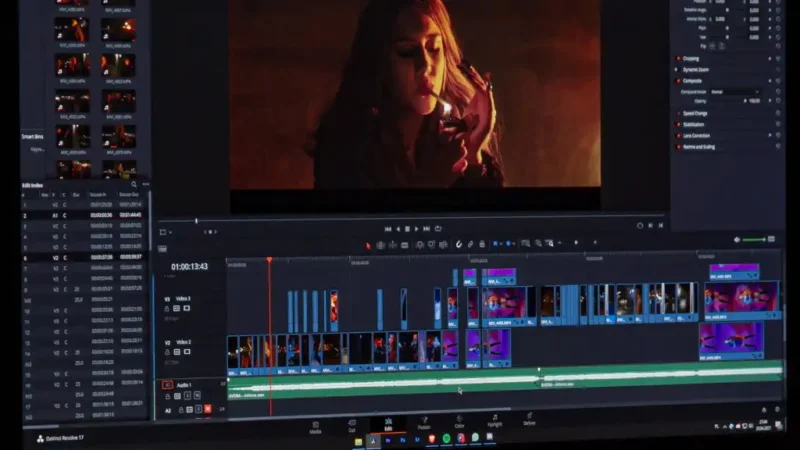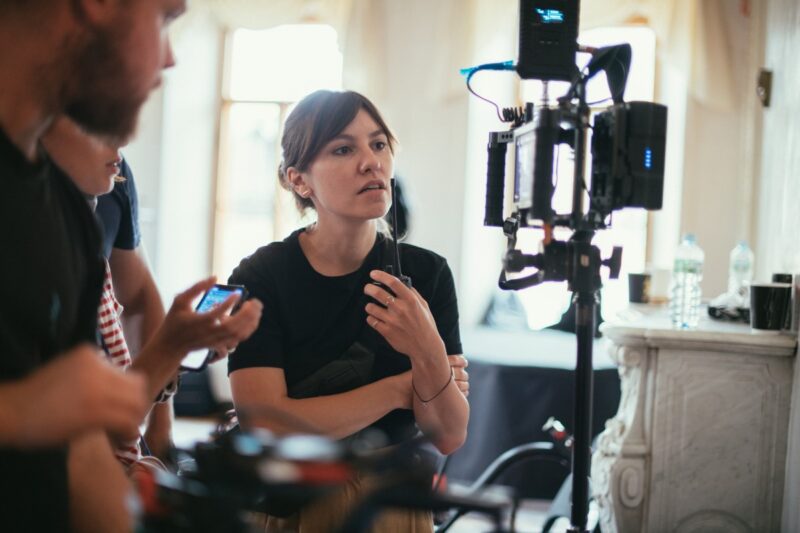Imagine you’re on the set of your first indie film. You’re excited but also overwhelmed by the sheer number of people working behind the scenes. Among them are producers, executive producers, and line producers. Who are they? What do they do?
Understanding their roles can make your filmmaking process smoother and more efficient. That’s why today we’ll break down their key roles, making it easy for you to understand the vital functions they perform in bringing a film to life.
What is a producer?
The producer is the central figure in a film’s production. They oversee the project from inception to completion, managing both the creative and business aspects.
A producer’s responsibilities include:
Developing the idea
Producers often start with a concept or script, working closely with writers and directors to shape the project. They may initiate the search for the perfect story or script that aligns with their vision. This phase can involve multiple drafts and revisions to ensure the story is compelling and feasible for production.
Producers also consider the marketability and audience appeal of the project during this development stage.
Securing financing
Producers find investors or production companies willing to fund the film. This involves pitching the project to potential backers and outlining the financial potential and artistic value of the film. They may need to secure funding from multiple sources, including studios, private investors, or crowdfunding campaigns.
Ensuring a solid financial plan is crucial to avoid running out of funds during production.
Hiring key personnel

They recruit the director, cast, and crew, ensuring the right people are in place to bring the vision to life. Producers look for individuals who not only have the necessary skills but also fit well with the project’s creative direction and team dynamics. This process often includes negotiations and contracts to secure top talent.
Building a cohesive and capable team is essential for a smooth production process.
Overseeing production
From pre-production to post-production, the producer ensures everything stays on track, on time, and within budget. They monitor daily progress, solve problems as they arise, and make critical decisions to keep the project moving forward.
This can involve coordinating schedules, managing resources, and keeping the production aligned with its artistic and financial goals.
Effective oversight helps prevent delays and budget overruns.
Key traits of a good producer
A successful producer is a master of multitasking, communication, and problem-solving. They must be resilient, adaptable, and possess a keen eye for talent and detail. Good producers are proactive, anticipating issues before they become major problems.
They are also excellent negotiators, able to secure the best deals for their projects.
Strong leadership and the ability to inspire and motivate their team are also critical traits.
The role of an executive producer
An executive producer (EP) typically focuses on the financial and strategic aspects of the film. They might be less involved in the day-to-day operations but are crucial in securing funding and ensuring the project aligns with its financial goals.
Key responsibilities include:
- Financing the project: EPs often bring in or invest significant funds. They might use their personal wealth, industry connections, or a combination of both to secure the necessary capital. This financial support is vital for covering production costs, from pre-production through to distribution. Without the EP’s financial backing, many films would never get off the ground.
- Networking: They leverage their industry connections to secure resources and distribution deals. Their extensive network can open doors to top-tier talent, favorable distribution channels, and lucrative partnerships. EPs often attend industry events and meetings to build and maintain these connections. Effective networking can significantly enhance a project’s chances of success.
- Guiding the project: They provide high-level oversight, ensuring the film aligns with its intended market and financial targets. This includes reviewing budgets, schedules, and major creative decisions to ensure they support the project’s goals. EPs often act as mentors to the producing team, offering advice and support based on their extensive experience. Their strategic input helps steer the project towards its intended audience and commercial success.
Imagine them as the project’s guardian angel. They ensure the necessary resources are available and the project’s financial health is maintained, allowing the creative team to focus on making a great film.
EPs often step in during critical moments to provide support or make tough decisions. Their involvement can make the difference between a project’s success or failure, particularly in navigating financial challenges.
The line producer
The line producer is the on-the-ground leader, managing the day-to-day operations of the production. Their job is to translate the producer’s vision into a practical, workable plan.
Key duties include:
Creating the budget
They develop a detailed budget and production schedule. This involves breaking down the script into individual scenes and estimating the cost of each element, from cast and crew to locations and equipment. Line producers must ensure that the budget is realistic and that funds are allocated efficiently.
A well-planned budget helps prevent financial shortfalls and keeps the production on track.
Managing the crew
Line producers oversee the hiring of crew members and ensure everyone is on the same page. They coordinate with department heads to ensure all roles are filled with qualified individuals. During production, they maintain clear communication with the crew to address any issues promptly.
Effective crew management is crucial for maintaining a productive and harmonious set.
Ensuring compliance

They handle legal and union matters, making sure the production adheres to regulations. This includes securing permits, managing contracts, and ensuring compliance with labor laws and union agreements. Line producers must stay updated on legal requirements to avoid potential fines or legal disputes.
Proper compliance helps protect the production from legal challenges and ensures a smooth operation.
Solving problems
When issues arise, the line producer is the first to respond, keeping the production on track. They troubleshoot problems, whether logistical, financial, or personnel-related, to minimize disruptions. Line producers need to think quickly and creatively to find effective solutions.
Their problem-solving skills are essential for overcoming the inevitable challenges of film production.
Traits of an effective LP
A great LP is organized, detail-oriented, and calm under pressure. They need to balance the creative vision with practical realities, making them essential to a smooth production. Effective line producers are excellent communicators, able to coordinate efforts across various departments.
They also possess strong leadership skills, motivating their team to perform at their best.
Their ability to stay composed and focused under pressure ensures that the production runs efficiently and meets its deadlines.
How to make everything work?

Know your team
- Communicate clearly: Regular check-ins and clear communication channels prevent misunderstandings. Use tools like project management software to keep everyone updated. Clear communication fosters a collaborative environment and ensures everyone is aligned with the project’s goals.
- Set realistic goals: Work with your producers to set achievable milestones and deadlines. Break down the production process into manageable phases, each with its own set of goals. Realistic goals help maintain motivation and track progress effectively.
- Trust their expertise: Lean on your producers’ knowledge and experience, especially in areas where you might be less experienced. Producers often bring a wealth of industry insight that can guide your decisions. Trusting their expertise can lead to better outcomes and a smoother production process.
Budget wisely
- Prioritize spending: Focus on essential areas like key talent and critical scenes. Allocate more funds to elements that have the greatest impact on the film’s quality and marketability. Prioritizing spending ensures that your resources are used effectively to enhance the final product.
- Track expenses: Keep detailed records of all expenditures to avoid surprises. Use accounting software or spreadsheets to monitor your budget in real-time. Tracking expenses helps you stay within budget and identify any areas where costs might be escalating.
- Plan for contingencies: Set aside a portion of your budget for unexpected costs. Productions often face unforeseen expenses, such as equipment repairs or location changes. Having a contingency fund allows you to handle these surprises without derailing the entire budget.
Stay flexible
Be ready to pivot
If something isn’t working, don’t be afraid to change course. Flexibility allows you to adapt to new information and unexpected challenges. Being open to change can lead to creative solutions and better outcomes.
Keep an open mind
Listen to your team’s suggestions and be willing to try new approaches. Collaboration can bring fresh perspectives and innovative ideas. An open mind fosters a positive and dynamic production environment.
The bottom line
Producing a film is a collaborative effort that requires the skills and dedication of many individuals. By understanding and appreciating the roles of the producer, executive producer, and line producer, you can foster a more efficient and harmonious production environment.
So, the next time you step onto a set, you’ll know exactly who to turn to for what, and how to make the most of your talented team.







